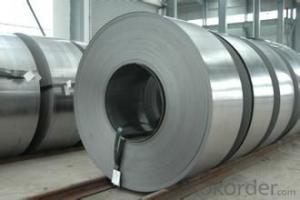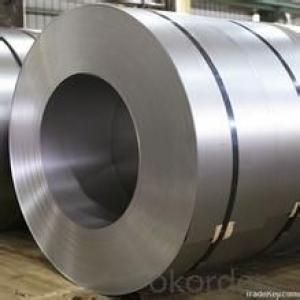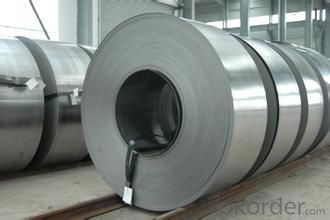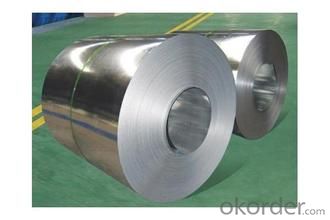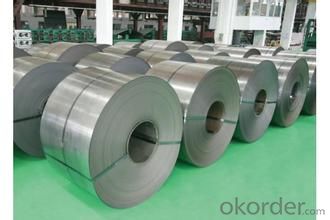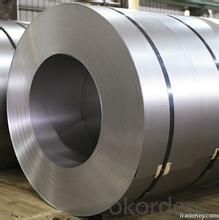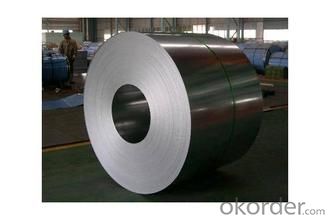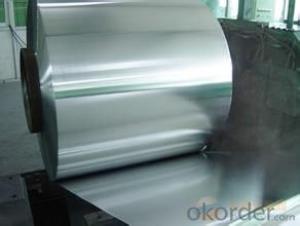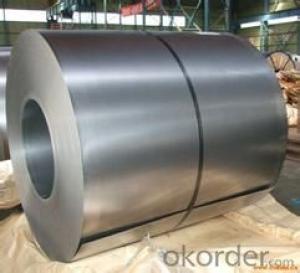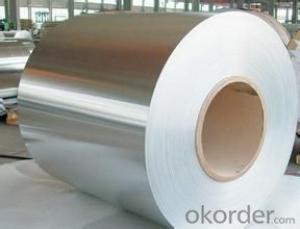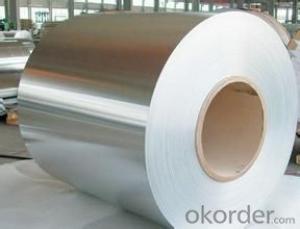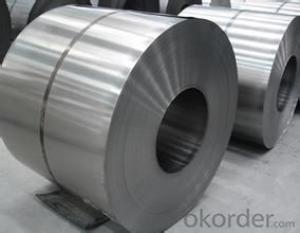Excellent cold rolled Steel Coil/Sheet -SPCCT-SB
- Loading Port:
- Tianjin
- Payment Terms:
- TT OR LC
- Min Order Qty:
- 100 m.t.
- Supply Capability:
- 5000000 m.t./month
OKorder Service Pledge
OKorder Financial Service
You Might Also Like
Specification:
COLD ROLLED STEEL | |
Thicknenss | 0.10mm-4.00mm |
Width | 600mm-2000mm |
Sheets length | 1200-6000mm |
Coil inner diameter | 508-610mm |
Surface treatement | matt finish/bright finish,oiling/dry, bright anneal/black anneal |
Coil weight | 3-5t |
Application:
1. Refrigerators, cabinets, power distribution baords and drums.
2. Automobile floor and roof panels.
3. Automobile fenders and quarter panels
4. Automobile fenders and quarter panels
Advantage
1. High Quality SurfaceFinish
2. High Dimensional Precision
3. Excellent mechanicalproperty
Package & Delivery
Package details: Standardseaworthy packing for international delivery.
Delivery: According to theexact quantity of your order.
Images:
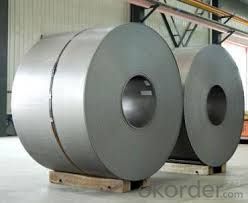
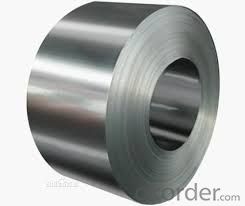
Quality of the goods could be guaranteed. The finished product has a variety of excellent capabilities, such as continuous rolling, degreasing, annealing, skin pass, slitting and cut to length line etc. Along with it many rocessing capability and smooth, flat surface. It’s widely used in outdoor and interior decoration, furnishing.
- Q: What are the different types of steel coil loading and unloading devices?
- There are several types of steel coil loading and unloading devices, including coil carriages, coil lifters, coil turners, coil grabs, and coil tilters. These devices are designed to safely and efficiently handle steel coils during the loading and unloading process, ensuring smooth operations in various industries such as manufacturing, construction, and transportation.
- Q: So here's the deal:I recently bought McCann's Instant Steel-Cut Oatmeal, and I'm wondering about any possible nutritional differences between the instant and regular stove-top. In case you haven't seen it, instant steel-cut comes in individual packets and is cooked only by adding boiling water, the same as instant rolled oatmeal (i.e. Quaker).When I asked about instant vs. stove-top rolled oats, my doctor said there are no significant nutritional differences, but since the main health appeal of steel-cut is the coarse grain, it doesn't seem possible for the finer ground instant to be as nutritious.I can't find much info about this, so any help is appreciated!
- Most people who are used to rolled oats have a very hard time adjusting to steel cut oats that are cooked only 30 minutes. For many, it's not much different than eating them raw. (Raw, soaked oats is called cram. Having to eat uncooked oats, as only the poorest would do, gives us the expression 'to cram it down your throat'.) Better still is to cook them thoroughly at night then reheat portions for breakfast if you're in a hurry. They'll keep about five days at a time under refrigeration. Any small nutritional loss from longer cooking is more than compensated by the better digestibility of well-cooked oats. That is, the nutrition is wasted if the oats pass undigested through the body. For most of us, that would happen. Indeed, we are not cows. Neither are we horses. People need to cook their oats.
- Q: How are steel coils used in the automotive stamping industry?
- Steel coils are used in the automotive stamping industry to provide a continuous supply of flat steel sheets that are then fed into stamping machines. These coils are unrolled, straightened, and then fed through the stamping presses to create various automotive parts, such as body panels, chassis components, and other structural parts. The use of steel coils ensures efficiency, precision, and a consistent quality in the production of automotive parts.
- Q: I'm looking for the weight of different types of steel and haven't found anything helpful!!thank you
- Category Material Density Metal Steel, tool 7.715 Metal Wrought Iron 7.75 Metal Carbon Tool Steel 7.82 Metal Steel, cold-drawn 7.83 Metal Carbon Steel 7.84 Metal Steel, C1020, HR 7.85 Metal Pure Iron 7.86 Metal Soft Steel (0.06% C) 7.87 Metal Stainless Steel, 304 8.03 Metal Stainless 18Cr-8Ni 8.03 I looked up specific gravity mild steel. This might get you pointed in the right direction.
- Q: Can steel coils be used in the food processing industry?
- Indeed, the food processing industry can utilize steel coils. These coils frequently serve as the foundation for a diverse array of food processing equipment, including conveyor belts, food storage tanks, mixing tanks, and processing machinery. Steel, characterized by its durability and hygienic properties, possesses resistance against corrosion, rendering it appropriate for deployment in food processing environments. Furthermore, steel coils facilitate effortless cleaning and sanitization, guaranteeing the safety and cleanliness of the food processing equipment. In conclusion, owing to their robustness, longevity, and adherence to food safety regulations, steel coils enjoy widespread employment within the food processing industry.
- Q: How are steel coils used in the manufacturing of storage cabinets?
- Steel coils are used in the manufacturing of storage cabinets as they are processed and shaped into sheets or panels, which are then cut, formed, and assembled to create the structural framework and outer shell of the cabinets. The steel coils provide strength, durability, and rigidity to the cabinets, ensuring their ability to withstand heavy loads and provide long-lasting storage solutions.
- Q: How are steel coils used in the manufacturing of construction excavators?
- Steel coils are used in the manufacturing of construction excavators as they are the primary material for constructing the structural components, such as the boom, arm, and bucket. These coils are processed into various shapes and sizes through cutting, bending, and welding techniques, and then assembled to create the sturdy and durable framework of the excavator.
- Q: How are steel coils used in the production of medical equipment?
- Steel coils have various applications in the manufacturing of medical equipment. One way they are commonly used is in the production of surgical instruments. Scalpels, forceps, and clamps, for example, require a cutting edge that is both sharp and long-lasting. Steel coils are ideal for creating these edges as they can be easily shaped, hardened, and sharpened, ensuring precision and durability. Furthermore, medical devices like braces, orthopedic implants, and prosthetics often incorporate steel coils. These devices necessitate materials with exceptional strength and durability to provide support and stability to the body. Steel coils can be molded into different forms and sizes to meet the specific needs of patients, delivering the required support and functionality. Moreover, steel coils find application in the manufacturing of medical equipment such as MRI machines and X-ray systems. These machines rely on robust and dependable components to guarantee accurate imaging and diagnostics. Steel coils are integral to the construction of these machines as they provide stability and structural support, enabling precise and high-quality imaging. To summarize, steel coils are of utmost importance in the production of medical equipment as they offer strength, durability, and versatility. Whether it's surgical instruments, orthopedic devices, or diagnostic machines, steel coils are utilized to create dependable and high-performing medical equipment that ultimately enhances patient care and outcomes.
- Q: How do steel coils contribute to the manufacturing of HVAC systems?
- The manufacturing of HVAC systems heavily relies on steel coils, which have a critical role. These coils typically consist of high-quality steel, known for its exceptional strength, durability, and resistance to heat. Heat exchangers are one of the primary applications of steel coils in HVAC systems. These exchangers play a vital role in transferring heat between different mediums, usually air and a refrigerant. In HVAC systems, steel coils are employed in both the evaporator and condenser coils. The evaporator coil absorbs heat from the indoor air, while the condenser coil releases heat to the external environment. These coils are designed with numerous coiled tubes connected by fins. The use of steel in their construction ensures their ability to withstand high pressure and resist corrosion, guaranteeing the long-term reliability and efficiency of the HVAC system. Steel coils also contribute to the overall structural integrity of HVAC systems. They are commonly utilized in the fabrication of ductwork, responsible for distributing conditioned air throughout a building. The strength and rigidity of steel coils enable the ductwork to maintain its shape and structural integrity under various conditions, including high air pressure and temperature fluctuations. Additionally, steel coils are frequently involved in the fabrication of HVAC system cabinets and enclosures. These cabinets house several system components, including compressors, fans, and control panels. The robustness of steel coils ensures that the cabinets can withstand external forces, protect the internal components, and provide a secure housing for the entire HVAC system. To summarize, steel coils are crucial components in the manufacturing of HVAC systems. Their strength, durability, and heat resistance make them ideal for applications such as heat exchangers, ductwork, cabinets, and enclosures. By incorporating steel coils, HVAC manufacturers can produce systems that efficiently regulate temperature, enhance indoor air quality, and provide comfort in various residential, commercial, and industrial settings.
- Q: How are steel coils used in the production of agricultural fencing?
- Steel coils are used in the production of agricultural fencing by being processed and shaped into wire strands that are then woven or welded to create the fence panels. These coils provide the necessary strength, durability, and rigidity required for effective and long-lasting agricultural fencing solutions.
Send your message to us
Excellent cold rolled Steel Coil/Sheet -SPCCT-SB
- Loading Port:
- Tianjin
- Payment Terms:
- TT OR LC
- Min Order Qty:
- 100 m.t.
- Supply Capability:
- 5000000 m.t./month
OKorder Service Pledge
OKorder Financial Service
Similar products
Hot products
Hot Searches
Related keywords
